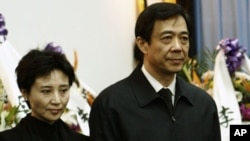The controversy surrounding China’s disgraced senior Communist Party member Bo Xilai swirled anew Tuesday with news that he was stripped of all his party positions and that his wife, Gu Kailai, is under investigation in the suspected murder of a British businessman.
Chinese state media reported late Tuesday that Bo was suspended from the party's 25-member Politburo and its 300-member Central Committee, on suspicion of "serious disciplinary violations."
The two-line report by the Xinhua news agency was the first official mention that Bo was suspected of wrongdoing since he was removed from his post last month as Communist Party leader of the southwestern megacity of Chongqing.
In a separate dispatch, Xinhua reported that Bo’s wife and an “orderly” in his home had been transferred to judicial authorities on “suspected crime of intentional homicide” in the death of Neil Heywood, a Briton believed to have had business ties to the family.
Bo was removed from his post after his longtime police chief, Wang Lijun, fled to a U.S. consulate reportedly to seek asylum, triggering one of the biggest political scandals in decades, and a national campaign to silence online discussion of it.
|
Listen to the full interview with Victor Shih |
Victor Shih, an associate professor of political science at Northwestern University specializing in Chinese politics, says the case shows cracks in China’s normally varnished image of unity, adding that this all suggests a power struggle behind the scenes.
“At this point [it’s] not quite behind the scenes, a lot is happening in public,” he said. “There could me more signs of infighting going forward.”
“This whole episode leading from the attempted defection of Wang Lijun to the U.S. really reveals that there are strong undercurrents in Chinese politics and the façade of unity that the Chinese leadership tries to portray to the world is just a façade,” said Shih.
Chinese government censors immediately blacked out Internet searches for Bo and all topics related to his case, including rumors that Bo’s wife was linked to Heywood’s death.
The attempts proved futile, and added to a growing storm of rumors flooding Chinese microblogs. The uproar prompted the British government to ask the Chinese government to investigate Heywood’s November death, which was initially ruled as alcohol poisoning. Heywood was cremated in December without an autopsy.
Bo, the son of one of the Communist Party's "founding fathers," had been a member of the Politburo, the highest echelon of political power in China. He aspired to be named to the Standing Committee, the innermost circle within the Politburo, when new members are appointed during the 18th Communist Party Congress later this year.
Political analysts believe Bo's populist governing style, which featured a return to leftist economic policies of the past, had set him apart from the relatively reform-minded party leaders who are expected to assume power in the coming months.
“Bo was seen as a very ambitious politician in the sense that he was using various methods to undermine his enemies and to buy alliances with other factios,” said Shih.
Shih said it remains to be seen if criminal charges will be brought against Bo and that in the past, when officials have fallen from grace, the party unified around the leadership, the officials were removed and there really was nothing much more to the story. But Shin says this case may be different.
“Because of the princeling status [Bo] had and the wide connections he enjoyed, he and his allies may try to fight these indictments and push back somehow. And if that were the case, I think we will see some interesting developments going forward,” Shih said.
Additional reporting by Ira Mellman.




